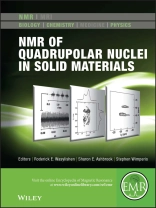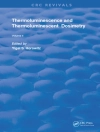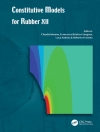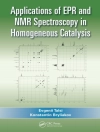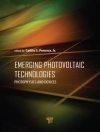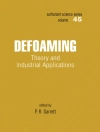NMR OF QUADRUPOLAR NUCLEI IN SOLID MATERIALS
Over the past 20 years technical developments in superconducting magnet technology and instrumentation have increased the potential of NMR spectroscopy so that it is now possible to study a wide range of solid materials. In addition, one can probe the nuclear environments of many other additional atoms that possess the property of spin. In particular, it is possible to carry out NMR experiments on isotopes that have nuclear spin greater that ½ (i.e. quadrupolar nuclei). Since more that two-thirds of all NMR active isotopes are quadrupolar nuclei, applications of NMR spectroscopy with quadrupolar nuclei are increasing rapidly.
The purpose of this handbook is to provide under a single cover the fundamental principles, techniques and applications of quadrupolar NMR as it pertains to solid materials. Each chapter has been prepared by an expert who has made significant contributions to out understanding and appreciation of the importance of NMR studies of quadrupolar nuclei in solids. The text is divided into three sections: The first provides the reader with the background necessary to appreciate the challenges in acquiring and interpreting NMR spectra of quadrupolar neclei in solids. The second presents cutting-edge techniques and methodology for employing these techniques to investigate quadrupolar nuclei in solids. The final section explores applications of solid-state NMR studies of solids ranging from investigations of dynamics, characterizations of biological samples, organic and inorganic materials, porous materials, glasses, catalysts, semiconductors and high-temperature superconductors.
About EMR Handbooks
The Encyclopedia of Magnetic Resonance (EMR) publishes a wide range of online articles on all aspects of magnetic resonance in physics, chemistry, biology and medicine. The existence-of this large number of articles, written by experts in various fields, is enabling the publication of a series of EMR Handbooks on specific areas of NMR and MRI. The chapters of each of these handbooks will comprise a carefully chosen selection of Encyclopedia articles. In consultation with the EMR Editorial Board, the EMR Handbooks are coherently planned in advance by -specially-selected Editors, and new articles, are written (together with updates of some already existing articles) to give appropriate complete coverage. The handbooks are intended to be of value and interest to research students, postdoctoral fellows and other researchers learning about the scientific area in question and undertaking relevant experiments, whether in -academia or industry.
Have the content of this handbook and the complete content of the Encyclopedia of Magnetic Resonance at your fingertips!
Visit: www.wileyonlinelibrary.com/ref/emr
Daftar Isi
Contributors ix
Series Preface xiii
Volume Preface xv
Part A: Basic Principles 1
1 Quadrupolar Interactions
Pascal P. Man 3
2 Quadrupolar Nuclei in Solids
Alexander J. Vega 17
3 Quadrupolar Coupling: An Introduction and Crystallographic Aspects
Sharon E. Ashbrook, Stephen Wimperis 45
4 Quadrupolar Nuclei in Solids: Influence of Different Interactions on Spectra
David L. Bryce, Roderick E. Wasylishen 63
Part B: Advanced Techniques 75
5 Acquisition of Wideline Solid-State NMR Spectra of Quadrupolar Nuclei
Robert W. Schurko 77
6 Sensitivity and Resolution Enhancement of Half-Integer Quadrupolar Nuclei in Solid-State NMR
Thomas T. Nakashima, Roderick E. Wasylishen 95
7 Quadrupolar Nutation Spectroscopy
Arno P.M. Kentgens 107
8 Dynamic Angle Spinning
Philip J. Grandinetti 121
9 Double Rotation (DOR) NMR
Ray Dupree 133
10 MQMAS NMR: Experimental Strategies
Jean-Paul Amoureux, Marek Pruski 143
11 STMAS NMR: Experimental Advances
Sharon E. Ashbrook, Stephen Wimperis 163
12 Correlation Experiments Involving Half-Integer Quadrupolar Nuclei
Michael Deschamps, Dominique Massiot 179
13 Computing Electric Field Gradient Tensors
Josef W. Zwanziger 199
Part C: Applications 211
14 Quadrupolar NMR to Investigate Dynamics in Solid Materials
Luke A. O’Dell, Christopher I. Ratcliffe 213
15 Alkali Metal NMR of Biological Molecules
Gang Wu 233
16 Nitrogen-14 NMR Studies of Biological Systems
Luminita Duma 255
17 Oxygen-17 NMR Studies of Organic and Biological Molecules
Gang Wu 273
18 Oxygen-17 NMR of Inorganic Materials
Sharon E. Ashbrook, Mark E. Smith 291
19 Chlorine, Bromine, and Iodine Solid-State NMR
David L. Bryce, Cory M. Widdifield, Rebecca P. Chapman, Robert J. Attrell 321
20 Quadrupolar NMR of Ionic Conductors, Batteries, and other Energy-Related Materials
Frédéric Blanc, Leigh Spencer, Gillian R. Goward 349
21 Quadrupolar NMR of Nanoporous Materials
Mohamed Haouas, Charlotte Martineau, Francis Taulelle 371
22 Quadrupolar NMR in the Earth Sciences
Jonathan F. Stebbins 387
23 Quadrupolar NMR of Superconductors
Nicholas J. Curro 401
24 Quadrupolar NMR of Semiconductors
James P. Yesinowski 417
25 Quadrupolar NMR of Metal Nuclides in Biological Materials
Tatyana Polenova, Andrew S. Lipton, Paul D. Ellis 439
26 Nuclear Waste Glasses: Insights from Solid-State NMR
Scott Kroeker 453
27 Quadrupolar Metal NMR of Oxide Materials Including Catalysts
Olga B. Lapina, Victor V. Terskikh 467
28 Quadrupolar NMR of Intermetallic Compounds
Frank Haarmann 495
Index 511
Tentang Penulis
Roderick E. Wasylishen, Canada Research Chair in Physical Chemistry, Department of -Chemistry, Edmonton, Alberta, Canada.
Sharon E. Ashbrook, Reader, School of Chemistry, University of St Andrews, UK.
Stephen Wimperis, Professor, Department of Chemistry, Faculty of Physical Sciences, -University of Glasgow, UK.
